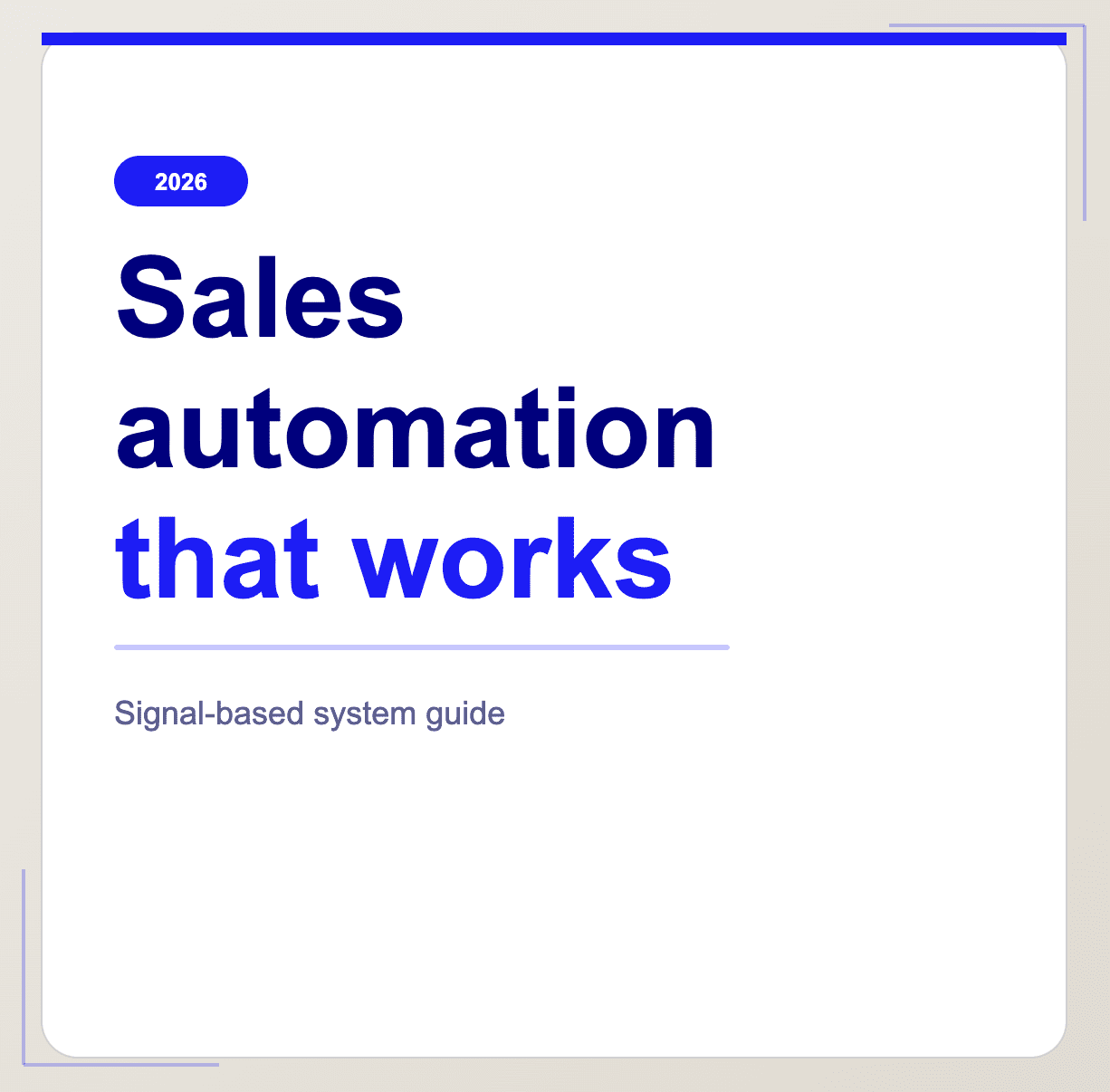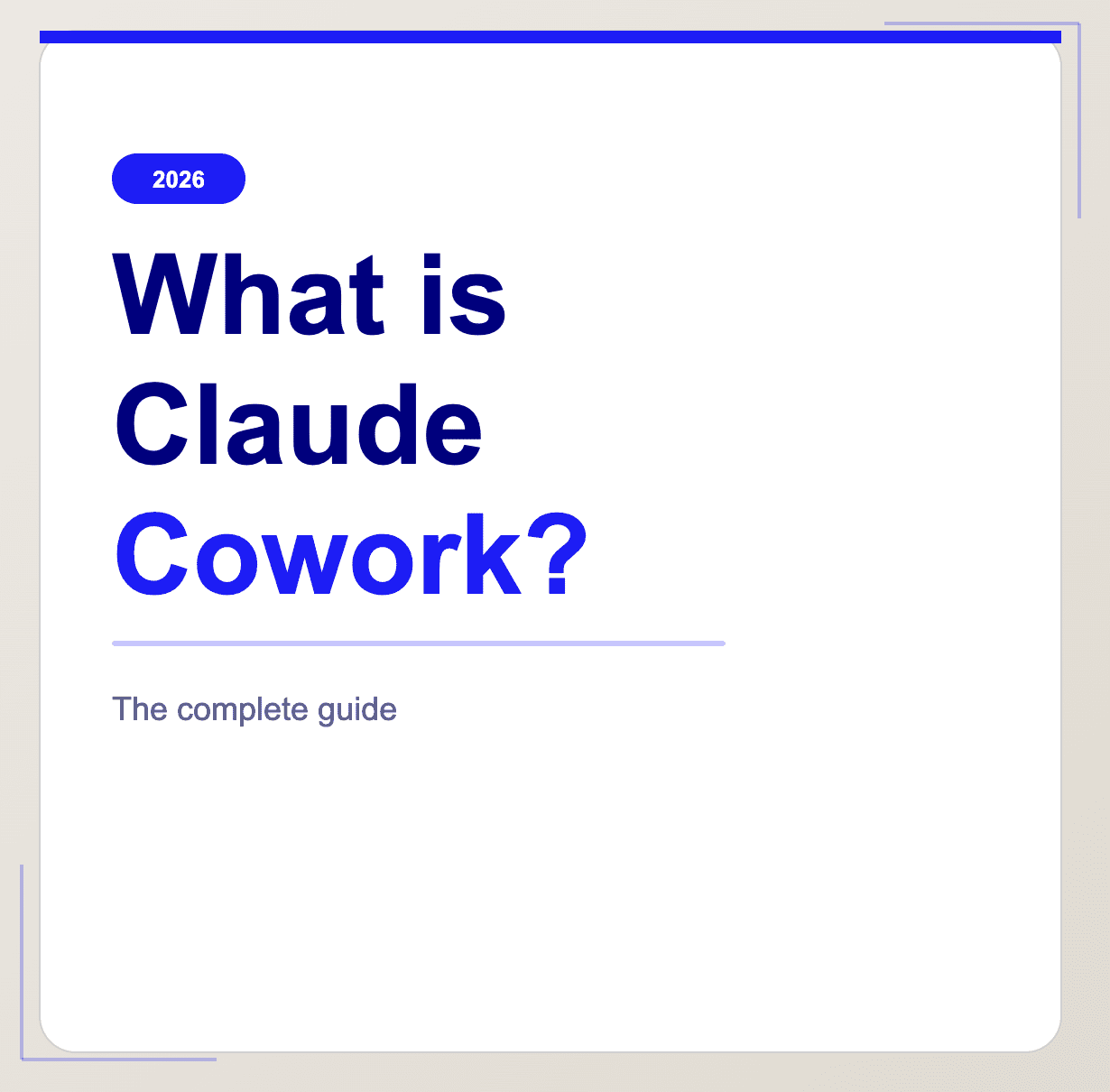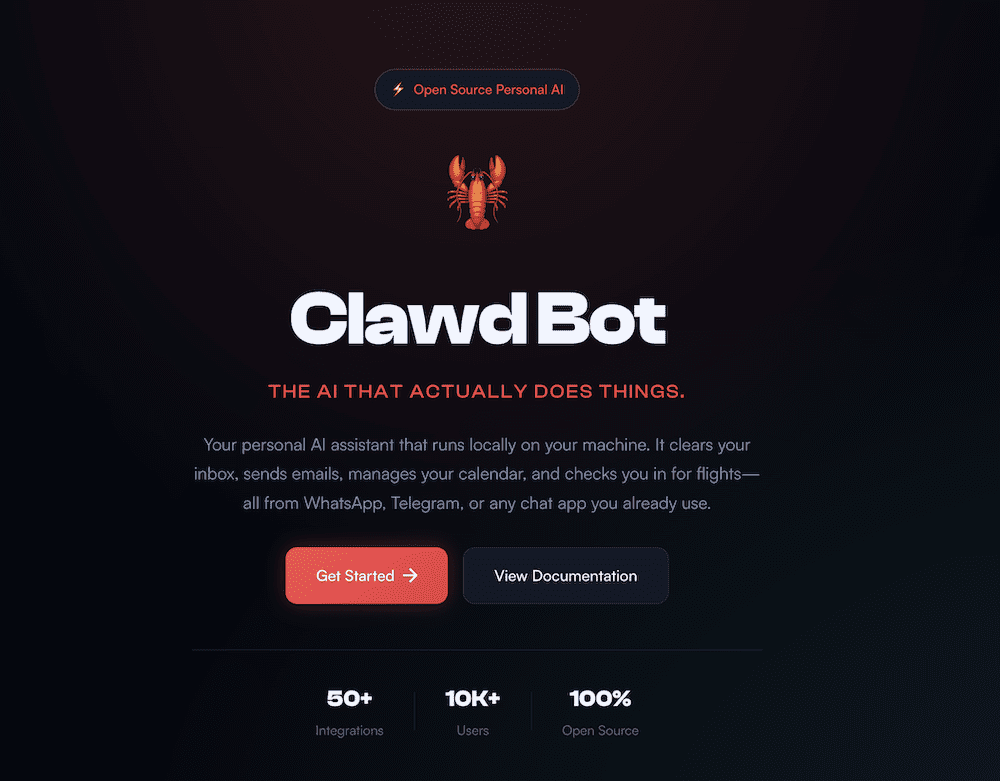Video conferencing has become a staple ingredient in modern sales, but without video conferencing tools, it’d be impossible. There’s a reduced amount of in-office meetings nowadays and geographical barriers are swiftly becoming a thing of the past. Let’s put our tool-hunting hats on and enter the digital age.
Why is Video Conferencing Important for Sales?
Video conferencing is paramount in sales for its ability to streamline communication and establish personal connections with prospects without being face-to-face.
Video conferencing tools are not just sales tools – they’re much more – but they are perfect for your remote sales team. A video call makes for a great introduction to a business relationship; including a face-to-face interaction personalizes your whole conversation far more than a simple voice call could.
It’s also great for you or your sales reps to get a good read on your prospect. Phone calls are still king for quick updates, but it’s no surprise that video conferencing has taken over the standard sales call. It’s much more intimate, while still allowing you to call from anywhere in the world.
Sales Video Calls for Different Stages
If you use video conferencing for your discovery calls, your team will be able to see the prospect’s reactions in real-time, helping them understand if they’re interested. This helps reps adjust their sales pitch to match the prospect’s feelings. Instead of arranging face-to-face meetings, you can show products over video, saving both time and money.
With video calls, follow-ups are easier too. You don’t have to meet in person so you can get in touch whenever you’ve both got some free time. Recording meetings can be helpful for your team too. They can review important points and impress your prospect during the follow-up by recalling information discussed weeks ago. This is especially handy if you bring up key details about the prospect, including their hobbies, aspirations, and pain points. The prospect will feel remembered and respected.
Another great thing about video conferencing tools is that they let you see non-verbal cues like body language and tone of voice too. You’ll be able to pick up on subtle doubts or sarcasm more easily which can be a massive help, but even if your prospects are tight-lipped about their doubts or worries, they’ll let it show through their quirks and mannerisms. They can’t not.
Video conferencing tools can also be used for objection handling, negotiating, and closing the deal. When it comes to objection handling, it’s one of the most critical parts of the sales process. With the added layer of intimacy that video conferencing provides, your sales reps can empathize more deeply with the prospect and reframe their objections more convincingly.
Additionally, when it comes to finalizing the deal, it’s likely that you’ll need to speak to extra decision makers. On average, buyers have 6-10 decision makers involved in a sale. Unlike regular phone calls, video calls allow multiple people to join at once and for you all to see each other so there’s no overlap when people are talking. It’s the perfect way to close more deals.
6 Unmissable Video Conferencing Tools For Your Team
Before we dive into the list, let’s do a quick high-level overview of the six competitors.
Features | MS Teams | Zoom | Google Meet | Webex | Skype | Go To Meeting |
Free Plan | 60 mins. 100 attendees. 10 GB. | 40 mins. 100 attendees. 0 GB. | 60 mins. 24 hours for 1:1 calls. 100 attendees. 0 GB. | 40 mins. Unlimited 1:1 calls. 100 attendees. 0 GB. | 100 hours per month. 100 attendees. 0 GB. | N/A |
Price Range | $4-12.50 per month. | $13.32-18.32+ per month. | $5.40-18+ per month. | $14-20+ per month. | Free. | $12-16+ per month. |
Cloud Storage Rande in Paid Plans | 10 GB – 1 TB | 5 GB – 10 GB. Unlimited (Enterprise only) | 30 GB – 5 TB+ | 5 GB – 10 GB | N/A | N/A |
Attendee Range in Paid Plans | 300 – 1,000 (19,000 in view only) | 100 – 1,000 | 100 – 1,000 | 150 – 1,000 | 100 only. | 150 – 250 |
Screen Sharing | Yes | Yes | Yes | Yes | Yes | Yes |
Screen Recording | Yes | Yes | Yes | Yes | No | Yes |
Transcriptions | Yes | Yes | Yes | Yes | No | Yes |
Integrations | 250+ | 1,000+ | 200+ | 25+ | 200+ | 80+ |
Video and Audio Quality | Excellent | Good | Great | Great | Good | Good |
Security | Great | Good | Great | Excellent | Good | Good |
Additional | Comes with all MS tools. | N/A | Comes with all Google tools. | N/A | N/A | N/A |
Total | 5 | 1 | 2 | 1 | 0 | 0 |
Let’s bear in mind here that the total is worked out by tallying the best in each comparison. Zoom, while only appearing to score 1, actually has second best in many of the topics, making it a great all-round tool, not to mention it’s the only one with unlimited cloud storage (albeit on Enterprise plan), and it’s the only one with 1,000+ integrations!
Google Meet has some strong plays too, andWebex comes out on top for security. Skype doesn’t particularly excel at anything, but all its features are completely free. At the end of the day though, it’s MS Teams that has the best free plan, the cheapest paid plans, and a whole bunch of other top of the line features.
1. Microsoft Teams
Microsoft Teams offers a wide range of features that you can utilize to streamline your prospecting efforts. It has several key features.
Collaborative
MS Teams supports real-time collaboration on presentations and sales documents, enabling your sales team to create and edit sales materials together. This ensures your sales content has consistency and that everyone will be on the same page with file-sharing features. When working together, you can cut hours from your workload. A 2022 survey found that when provided with collaboration tools, they saved three to five hours per week of valuable work time!
Instant Messaging
MS Teams provides in-house chat functions to streamline your team’s communication. By using this feature, strategies can more easily be refined and none of your reps will be out of the loop.
Furthermore, instant messaging within your team enables fast and efficient communication. There are also presence indicators which allow you to set whether you’re available or not.
Through a third-party integration with a live chat application, you can even engage with customers in real-time. Live chat has the highest satisfaction levels for any customer service channel, with 73%, compared with 61% for email and 44% for phone.
Cloud-Based Phone System
Microsoft Teams Phone is perfect for staying connected with the rest of the team inside and outside the office. You can add colleagues to the conversation in real-time, transfer your desktop calls to your mobile, and even use advanced features like recording and transcription all from your smartphone.
Drawbacks
MS Teams isn’t without its faults though; it requires a subscription if you don’t pay for Microsoft Office already, it has a limited number of channels which limits larger organizations, and it’s overly complicated in many aspects. Many of its tools are too similar and thus users don’t know which tools to use for which situation. Let’s take a look at the specific pros and cons of Microsoft Teams in sales.
MS Teams Pros For Sales Teams
- Efficient. Easily set up meetings with recording and transcription features.
- Instant communication. Online meetings, calling, and instant chat anywhere at any time.
- Intuitive. The layout is well-organized.
- User friendly. Easy to navigate between live chats, channels, and sales files.
- Organization. Streamlined organization and rapid file sharing.
- Cost. The subscription packages are some of the best you’ll find.
- Free plan. MS Teams offers a great free plan with 10GB cloud storage included!
- Mobile access. Microsoft Teams Phone application allows you to use Teams from your mobile anywhere.
MS Teams Cons For Sales Teams
- Constraints. There is a limit to the number of channels you can use privately: 30. Only 250 members are allowed per channel. If you have a large company, this is a big stumbling block.
- Confusing. There’s a confusing amount of similar tools rolled into MS Office. Check out the wheel below for a clearer view.
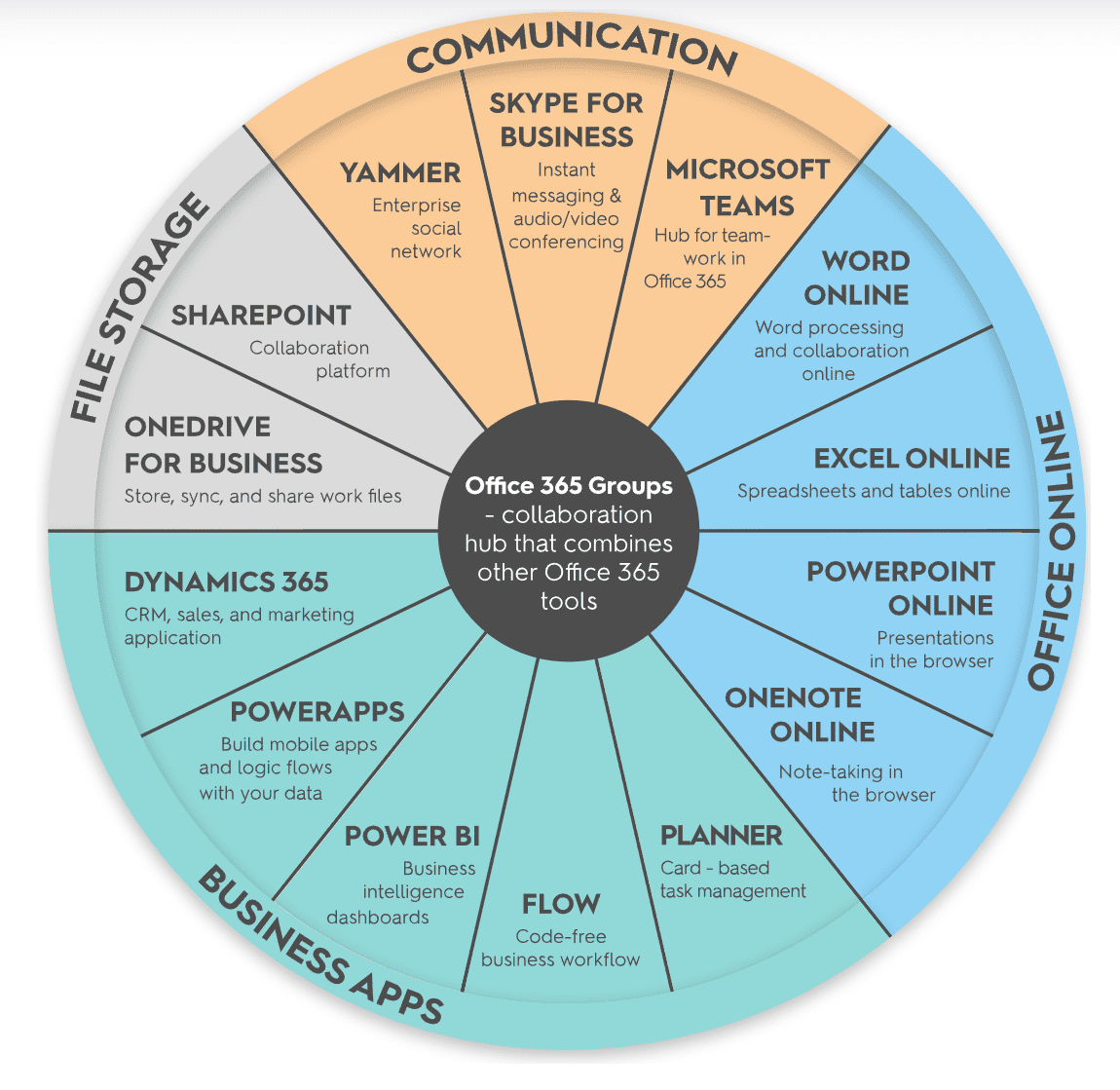
Free Plan Features
Microsoft Teams offers a free plan but only for basic features like messaging and calling. The storage is limited to 10GB, there is a maximum limit of 100 attendees per meeting, and it only allows 60 minutes per meeting.
This is perfect to start with and get a feel for the tool. It’s one of the most competitive free plans in this list of video conferencing tools, but it certainly isn’t sustainable for businesses.
Business Plan Pricing Structure
Microsoft offers four business plans: Essentials, Basic, Standard, and Premium. You can see the first three below.
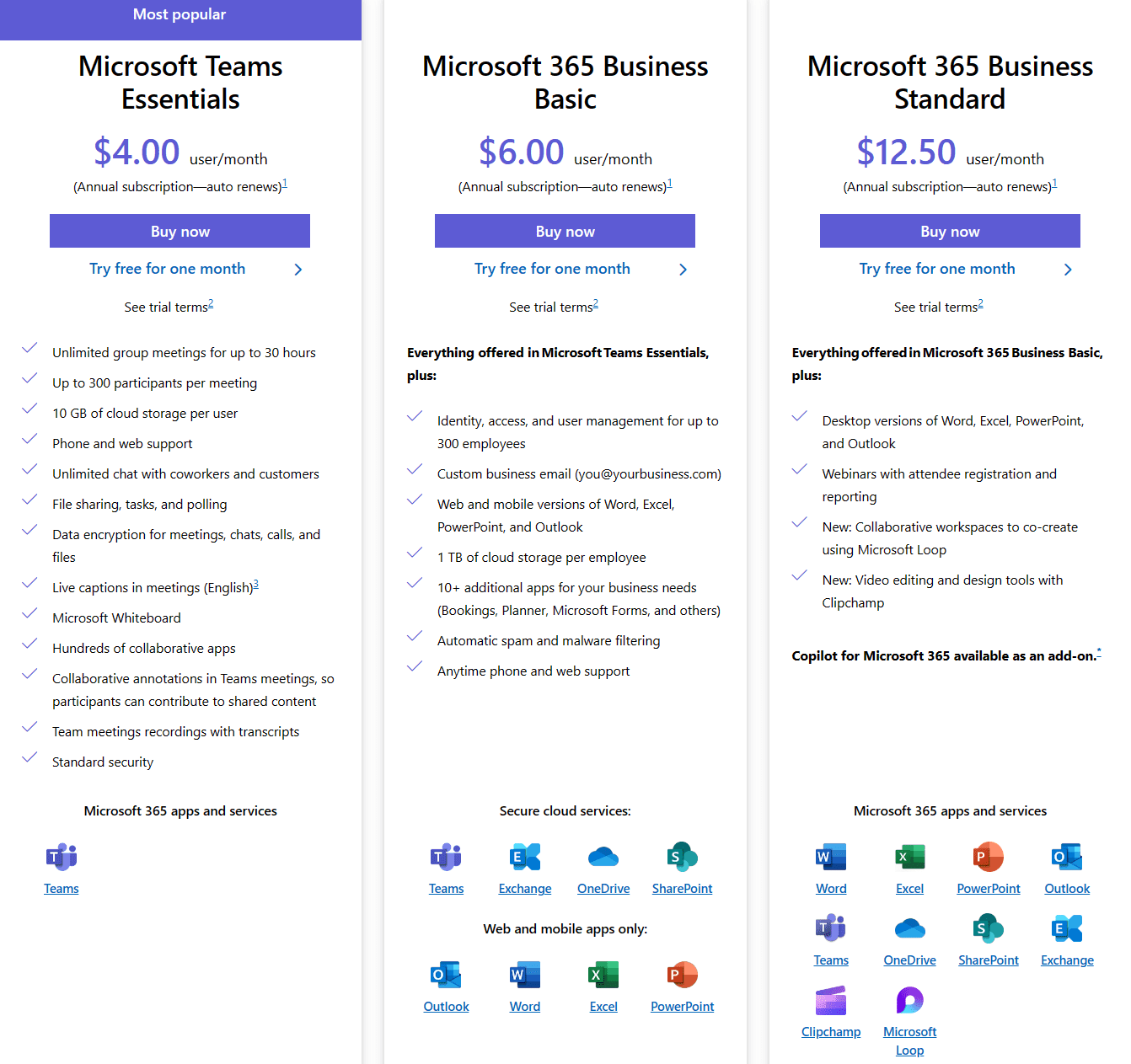
The Premium plan includes all these features plus advanced security, access and data control, and cyber threat protection for $22 per user per month.
2. Zoom
Zoom is another popular conferencing platform that provides global sales teams with the means to conduct virtual meetings. Zoom itself is such a popular video conferencing tool that it became synonymous with video calling during the pandemic. Here are some of its dominant features.
Communication and Collaboration Tools
Zoom has an abundance of communication tools, including chat and screen-sharing. This enables your team to deliver presentations and collaborate on sales projects with ease, turbocharging productivity. A study found that 72% of executives believe effective communication improves productivity!
Recording
Zoom has a recording feature that helps you capture meetings for future reference. This is great for when some team members are absent as it allows them to stay informed and up to date with the latest sales objectives.
If you want to take this a step further and make the accessibility of these recordings ten times easier, tl;dv empowers you to create clips, reels, and share timestamps straight to your CRM or directly with colleagues so they can jump straight to the relevant bits.
Ensure your team follows your winning Playbooks
Define your winning Playbook per Deal Stage, and let our AI handle the analysis. Monitor how well your sales team follows it and where new hires have opportunities to improve their win rates. Provide private feedback directly on each meeting.
Tackle Customer Objections with AI
Understand how your team handles common customer objections across hundreds of calls.
Spot where they excel and where they can improve to win more deals!
Onboard new reps 2X faster
Organize clips and reels of what great sales calls look like according to your own playbooks.
Watch your Reps save 30 minutes on each meeting
Improve overall team efficiency and ensure each rep can save over 4 hours each week by automating meeting preparation, follow-up emails and CRM updates.
Analytics
Zoom also comes with analytics and reporting tools that give you an influx of valuable insights into meeting attendance and levels of engagement during each meeting.
Say you’re running a sales pitch, you’ll be able to identify which parts of the pitch were the most engaging by looking back at the part of the call that generated the most interest or participation from prospects. Even better, you can run these analytics over multiple calls to gather more data.
Customization
With the shift to remote work, Zoom calls give you access to the virtual background feature, perfect for creating that office illusion when you’re sitting at home in your slippers.
You can also record a personalized video email rather than just your standard typed email, tailoring an introduction per recipient. How personal and deep you want to go is entirely up to you.
Drawbacks
Zoom is a solid video conferencing tool, but it can be inconsistent at times. It has limited high resolution and it’s reported to glitch out a lot technically. There are also a number of concerning security issues.
Additionally, due to its free plan, employees of Zoom are often more aggressive when upselling.
Zoom Pros For Sales Teams
- Efficient Collaboration. Virtual meetings and chats.
- Support. AI meeting assistant.
- Interactive. Screen sharing and a meeting recording feature.
- Customizable features. Personalized video emails and virtual backgrounds.
- User-friendly. A free, easy-to-use video conferencing app that supports large audiences.
- Seamless integrations. Fully compatible with Google Calendar and offers integrations with other apps.
Zoom Cons For Sales Teams
- Cost. Although Zoom offers a free plan, the larger plans needed for big businesses, set you back capital.
- Limited video quality. Zoom does not have access to 1080p video quality.
- Mandatory download. Zoom requires an application to download.
- Limited security features. Zoombombing is still more common than it should be.
- CRM constraints. Limited CRM integration capabilities.
Free Plan Features
Zoom offers a free plan with unlimited calls at 40 minutes per video call and up to 100 participants can attend. This isn’t bad to get started, but the 40 minute cap is the main drawback. There are workarounds, but they’re not something you want to do regularly, and certainly not with multiple people.
Zoom Paid Plan Pricing Structure
Zoom has five plans: Basic, Pro, Business, Business Plus, and Enterprise. The basic plan is the free plan outlined above. Pro will set you back just over $13 per user per month and you’ll receive an AI companion, 5GB of cloud storage data, and up to 30-hour meetings (which we hope none of you have to suffer through).
Business and the higher end plans unlock more participants, the Zoom Whiteboard, and the Zoom Phone, as well as other things. You can see the full details below.
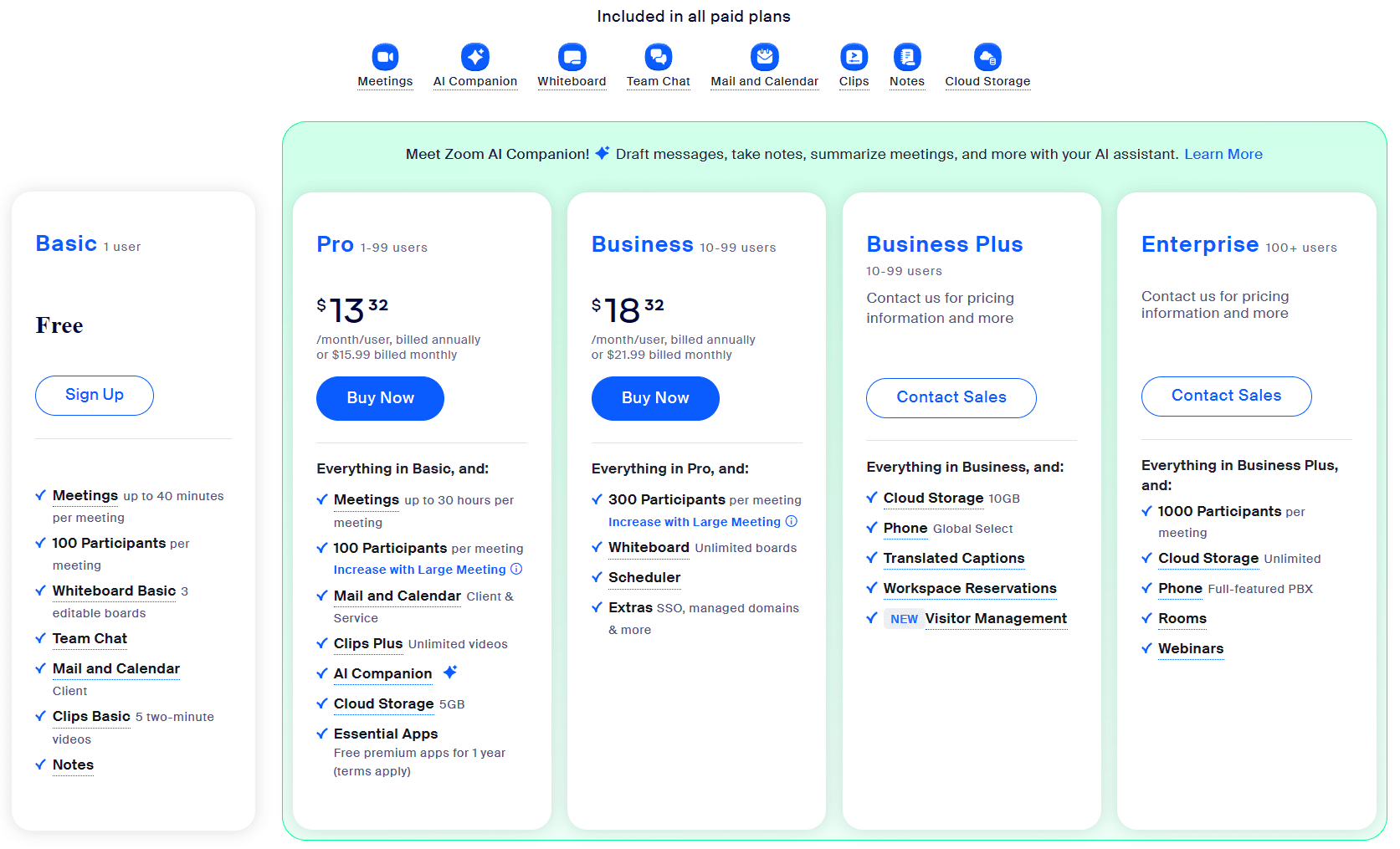
Read our guide for a more detailed dive into Zoom vs MS Teams.
3. Google Meet
Google Meet is known for being a user-friendly platform that allows virtual meetings from any location. It accommodates small one-to-one sessions as well as large groups which allows scalability for your team. Here are some of its best features:
Integration and Scheduling
Due to its wide range of applications, Google Meet integrates seamlessly with Google Drive, Google Calendar, and Gmail, making it easier to organize meetings, communicate with prospects, and share documents.
This is especially true for Google Calendar as it’s essential for organizing your team’s sales calls and providing a shared calendar that all teammates can access for enhanced collaboration.
Collaboration
Screen sharing is a key feature Google Meet offers, allowing real-time collaboration with teams and prospects on documents, spreadsheets, and sales presentations. As Google Meet is compatible with the entire suite of Google applications, it makes sense to use this if your organization is already using Google for its other tools.
Recording and Noise Cancellation
The paid version of Google Meet offers recording features that allow you to record your meetings, a growing necessity in the fast-paced world of sales.
The paid version of Google Meet also includes noise-canceling technology which is perfect for remote settings as it eliminates all background noise. This is particularly great for sales as you want crystal clear communication with your prospect so you can note down all the important things they have to say.
Mobile Access
If you’re on the move, you have full mobile access to Google Meet and can take meetings via all smart devices and browsers. Regardless of whether you’re using the free plan or paid, you can host unlimited meetings with Google Meet; however, the free version does have its limitations.
Drawbacks
Google Meet’s features are somewhat limited compared to competitors. It offers no waiting room or whiteboard to assist teams with organizing the meeting attendees or demonstrating something on-screen.
Google Meet Pros For Sales Teams
- Video conferencing features. Virtual meetings, screen sharing, and meeting recorder features are all seamless and well-oiled.
- Cost and security. Google Meet is free to use and has encrypted security features.
- Background noise. Google offers noise-canceling technology.
- Additional support. Google Meet provides live subtitles.
- Customization. You can easily blur your background.
- Collaborations. Integrates seamlessly with other Google apps.
- Mobile friendly. Google Meet is accessible from almost any device, be it mobile, notebook, or laptop.
- Good free plan. The free version of Meet allows one-to-one meetings that are 24 hours long, or 60 mins for multiple participants.
Google Meet Cons For Sales Teams
- No waiting room. There’s no waiting room feature for introducing people to your meeting at your own tempo.
- Only manageable by admin. Non-admins can’t pull the shots.
- Limited attendees. Only allows 100 participants, which reduces its efficiency for larger organizations.
Free Plan Features
If you have a Google account, Google Meet is free, and you can invite up to 100 participants for a total of 60 minutes at no cost at all. You can also have a one-to-one call for 24 hours!
Google Meet Paid Plans
Google Meet is under the umbrella of Google Workspace, so when you subscribe you get the whole package. The Business Starter nets you 30GB of pooled storage per user, standard support, and a custom, secure business email. Business Standard boosts the storage to 2TB and increases the participants to a maximum of 150, while Business Plus allows for a whopping 500 participants and 5TB of pooled storage per user.
See below for full details.
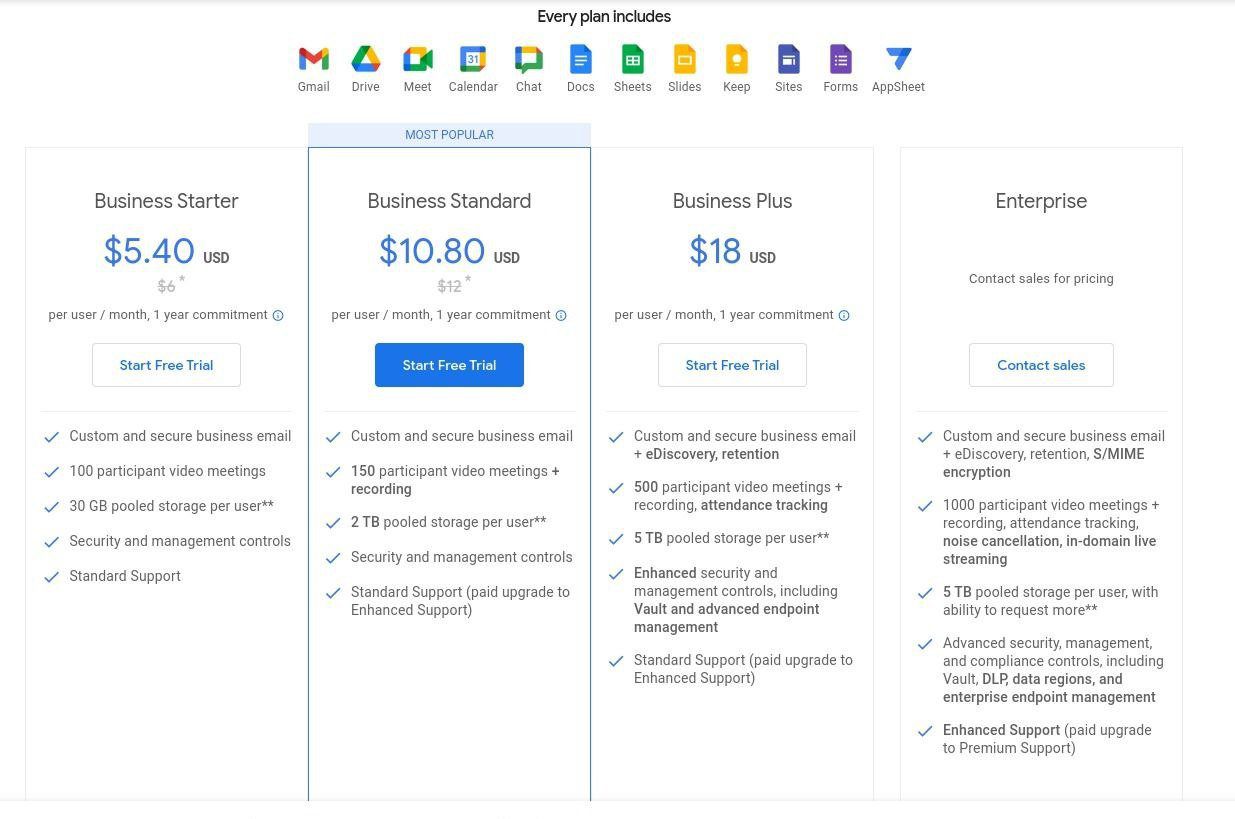
For a more detailed comparison, have a look at our guide to Google Meet vs MS Teams.
4. Cisco Webex
Webex is a top pick for sales teams as it offers HD video, screen sharing, and file sharing, making communication and collaboration easy to foster within your team. It integrates well with CRM systems to help you streamline your sales processes.
It’s one of the leading video conferencing tools in regard to security. It includes modern end-to-end encryption for meetings, is visibly compliant, and includes additional security measures for teams that want to be super sure their data is protected.
Overall, it’s a secure and reliable platform for video conferencing.
Drawbacks
This particular video conferencing tool is not very user-friendly, however. The interface isn’t super clear and some people find it more difficult to use than its more well-known competitors. It’s also on the pricey end of the spectrum.
Cisco Webex Pros For Sales Teams
- Good free plan. Call up to 100 people for up to 40 minutes without spending a dime.
- Video quality. HD Video conferencing.
- Collaboration features. Send internal calls & messages, share files, and use the interactive whiteboard.
- CRM Integrations. Link your sales calls directly to your CRM.
- Screen sharing feature. The screen sharing feature is intuitive, free, and easy to use.
- Strong security measures. Webex has state-of-the-art security measures in place to protect your company’s data.
Cisco Webex Cons For Sales Teams
- Premium costing. Paid plans can be considered a little expensive compared to other video conferencing tools.
- Dashboard. The user interface is not intuitive.
- Not user-friendly. Some consider the platform to be a little complex.
Free Plan Features
You can get free calls for up to 40 minutes for up to 100 participants. While this isn’t the best free plan we’ve seen, it’s certainly a good way to try it out.
Webex Pricing Structure
In addition to the free plan, Webex offers three paid ones: Starter, Business, and Enterprise.
Starter extends the meeting length to 24 hours, increases the participant allowance to 150, and includes things like closed captions and 5GB of cloud storage for meeting recordings. The Business plan boosts this to 10GB and ups the amount of meeting attendees allowed to 200. Enterprise can see you meeting with 1,000 people.
See below for exact details.
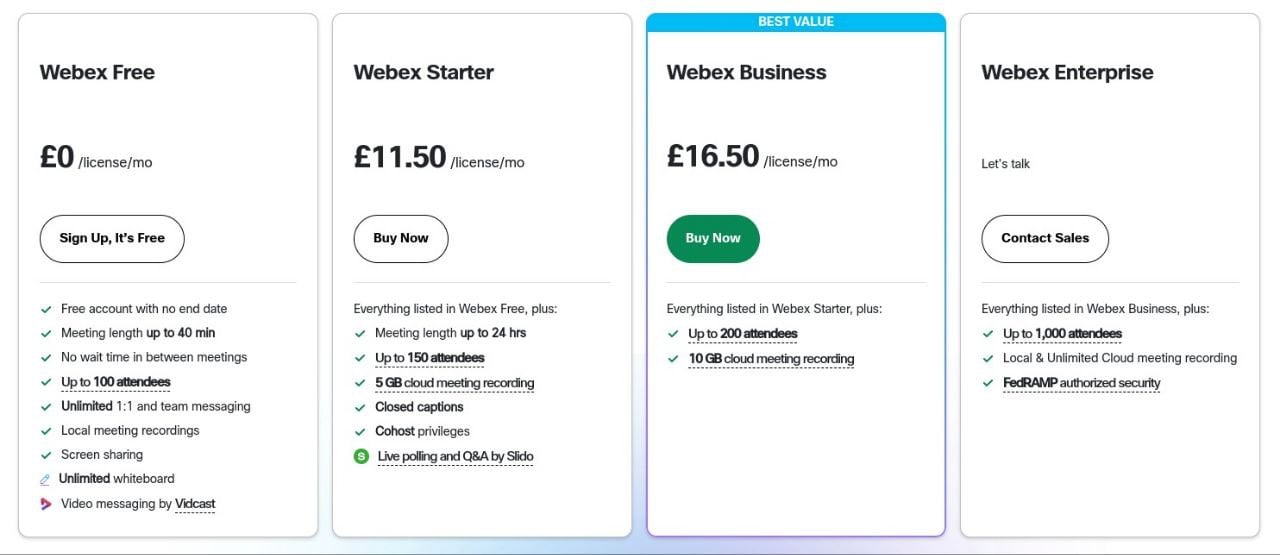
5. Skype
Although Skype is mostly remembered as the dominant video conferencing application of the 00s, it still holds some ground among fellow video conferencing tools. However, compared to the top 3 on the market, Skype lags behind. It’s no wonder why: Microsoft bought Skype for $8.5 billion in 2011, and since then, they’ve preferred to market MS Teams ahead of Skype.
Funnily enough, while personal use of Skype is dropping every year, it’s still popular among businesses. Skype offers excellent instant messaging services, ensuring you can get quick replies to inquiries about leads. It’s simple to set up, free to use, and easy to access from your mobile.
A solid advantage of Skype is its intuitive phone calling feature where you can save capital on traditional phone bills. If you’ve got customers in different countries, this might be something worth looking into. Skype also offers screen-sharing features for you to present your products.
Drawbacks
The obvious elephant in the room is the lack of advanced video options that Skype provides, especially in a day and age where video calling is a common occurrence.
Skype Pros For Sales Teams
- Setup. Super easy to install.
- Cost. It’s free to download.
- Landline services. Skype offers free phone communication calls.
- Communications. It offers instant messaging.
- Mobile Access. It’s convenient for remote work.
Skype Cons For Sales Teams
- Video quality. The reliability and quality of video is not the same level as other video conferencing tools.
- Features. Skype offers limited features compared to others.
- Lacks robust security. Skype doesn’t use end-to-end encryption.
- Help. Difficult to access customer support.
Skype Free Plan
Skype is completely free and allows for 100 users per Skype call. The only charges related to Skype come from international call rates, which tend to be better than your typical landline.
If you want advanced features, Microsoft will guide you towards their beloved MS Teams.
6. GoToMeeting
GoToMeeting is another great video conferencing tool that provides high-quality video calls and screen sharing.
GoToMeeting integrates with numerous existing sales tools and CRMs, making your life easier. When apps work together like this, it saves you and your team so much time that would usually be wasted on tedious and repetitive tasks. These integrations also help you schedule and log meetings within the same work application, preventing the need to switch between different ones. While they don’t offer hundreds of integrations, the ones they do offer are to top platforms.
When you use GoToMeeting, you’ll be able to have productive virtual meetings anywhere, anytime from your laptop or phone. Documents can be shared in real-time and meetings can be recorded. Finally, GoToMeeting allows up to 250 attendees, making it ideal for putting on a large scale meeting.
Drawbacks
One of the biggest drawbacks of GoToMeeting is that it has no free plan. You can test it out with a trial, but there’s a time limit included which adds pressure to the decision. All the other video conferencing tools on this list include a free plan, so this is a huge drawback.
GoToMeeting Pros For Sales Teams
- Video conferencing features. GoToMeeting provides meeting recordings, screen sharing, and transcription features.
- Collaboration. Can share real-time documents.
- Flexible attendee count. GoToMeeting permits large meeting numbers.
- Numerous integrations. Integrate with all your favorite work tools and apps.
- Additional features. Offers breakout rooms and a virtual whiteboard in the paid plans.
GoToMeeting Cons For Sales Teams
- Instant Chat. The chat option isn’t as great as some other video conferencing tools on this list.
- Free plan. They have no free plan!
- Complex. The platform has more of a learning curve than its competitors.
Free Plan
There is no free plan. GoToMeeting offers a free 14-day trial and they’ll notify you before it ends to give you a chance to cancel if you don’t wish to subscribe, but they don’t offer any permanent free plans.
GoToMeeting Pricing Structure
There are three plans: Professional, Business, and Enterprise. Pro plans include up to 150 participants, while Business ups that to 250. All plans include basic features such as screen sharing, HD video, and endless meetings.
The Business plan is impressive as it offers unlimited cloud recording, as well as a Smart Assistant and note-taking capabilities, important for sales teams.
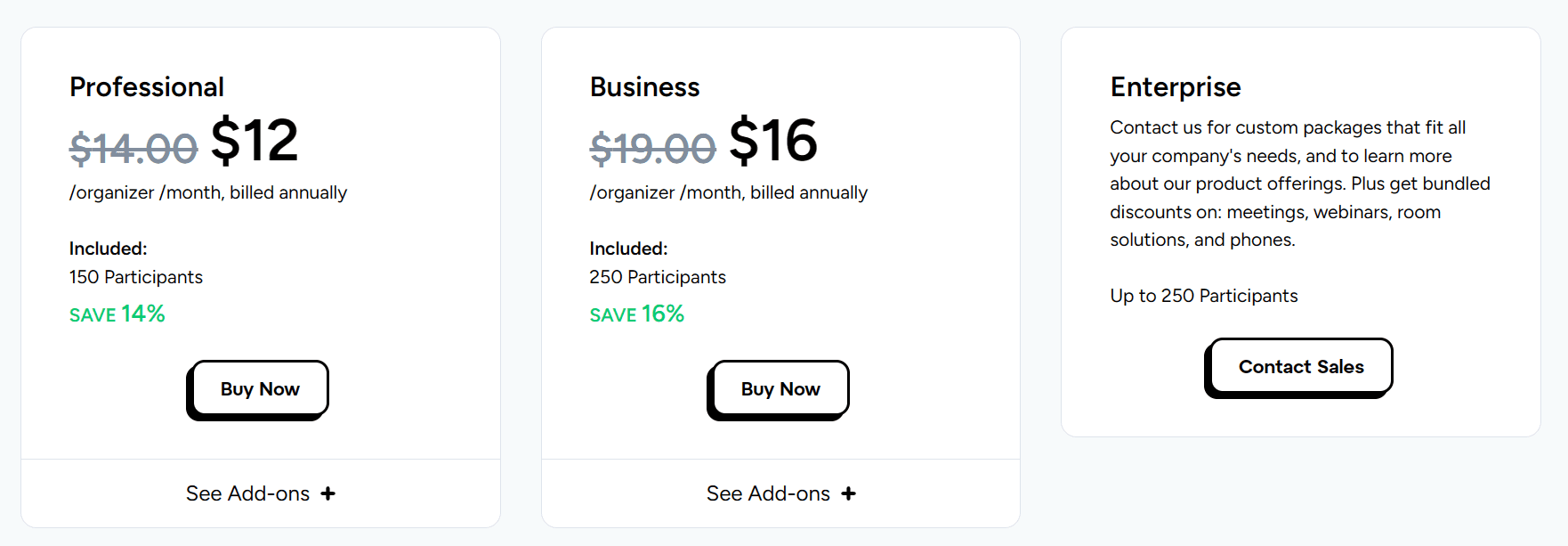
Take Your Sales Game Up A Notch
Video conferencing tools are vital in modern-day sales. They enable seamless communication and collaboration with your team and prospects, regardless of where in the world they may be. Virtual meetings, screen sharing, meeting recording, and CRM integrations make video conferencing tools great assets to your team.
When comparing the big three, Google Meet is straightforward to use but lacks advanced features. Zoom offers simple video conferencing and screen-sharing but has well-documented security problems. Microsoft Teams is effective but more complex than the other two and thus sales teams should consider this when deciding on the best tool.
Having said that, they all offer an abundance of quality features to assist with your virtual meetings whether remote or in the office.


